外研版九年级下册 Module 4 Unit 3 Language in use. 课件 (共45张PPT)
文档属性
| 名称 | 外研版九年级下册 Module 4 Unit 3 Language in use. 课件 (共45张PPT) |  | |
| 格式 | ppt | ||
| 文件大小 | 2.8MB | ||
| 资源类型 | 教案 | ||
| 版本资源 | 外研版 | ||
| 科目 | 英语 | ||
| 更新时间 | 2022-08-17 09:31:17 | ||
图片预览

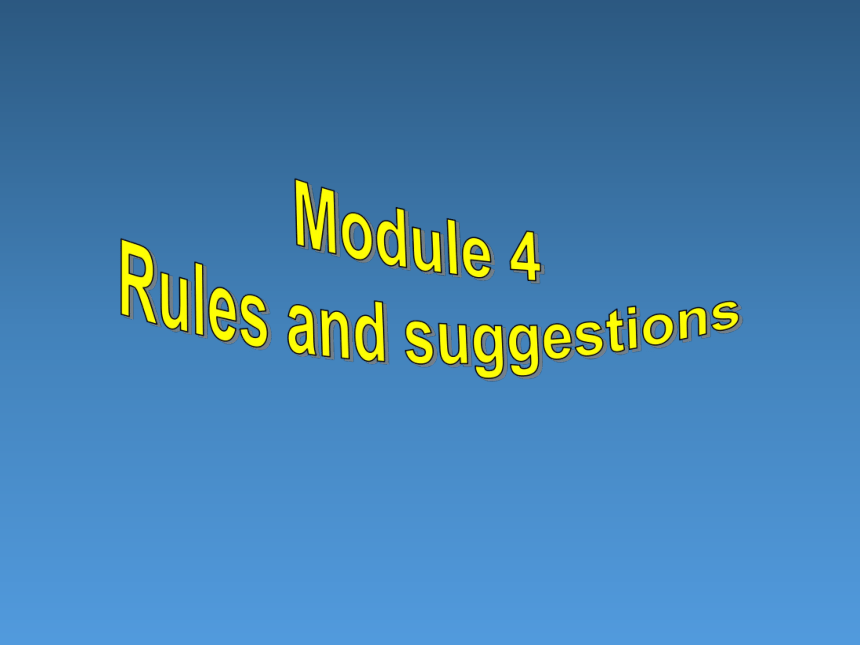
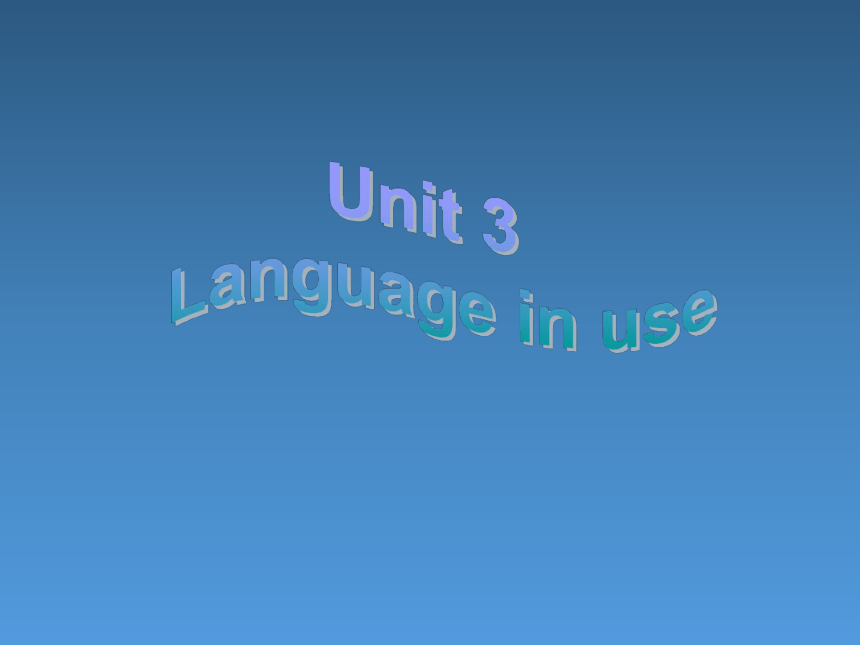
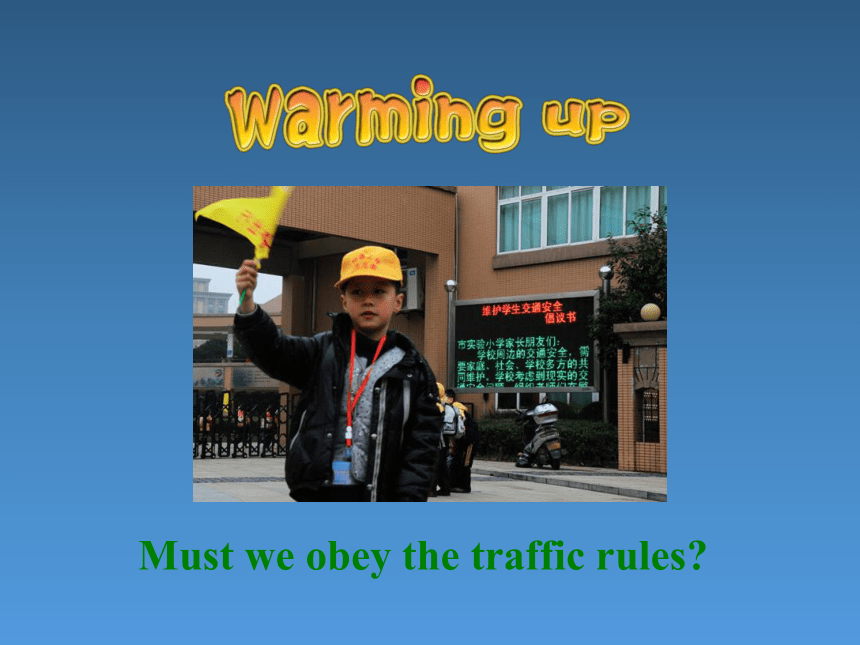
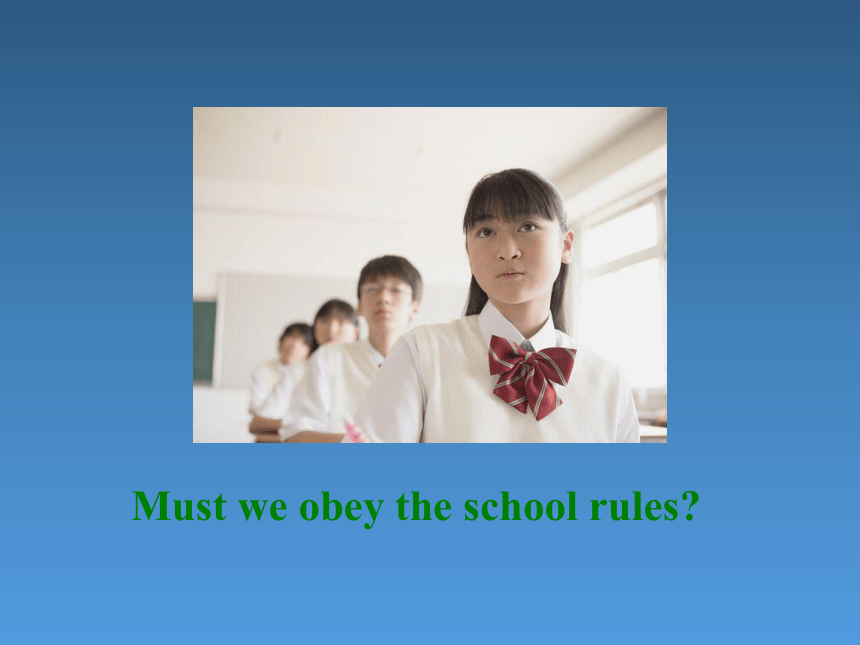

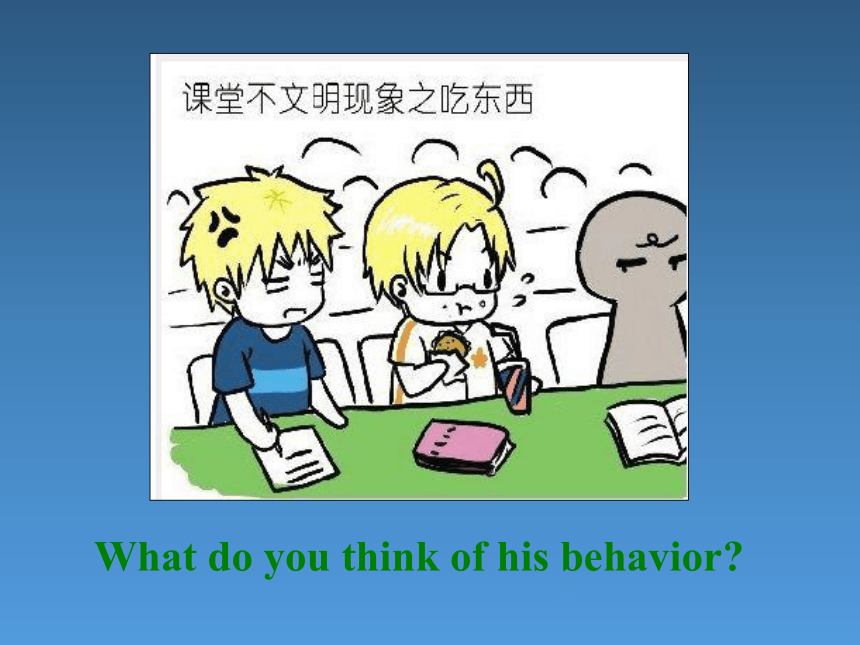
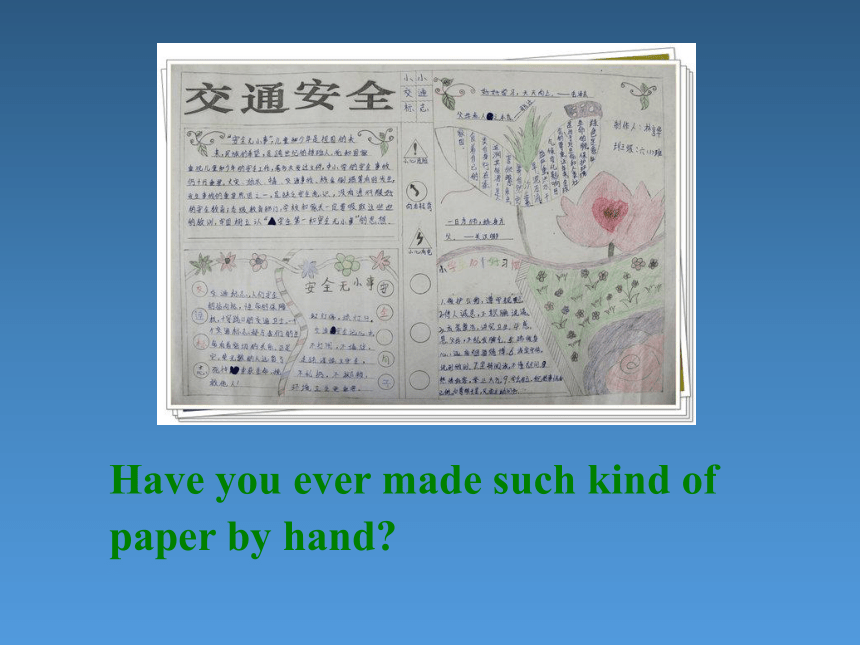
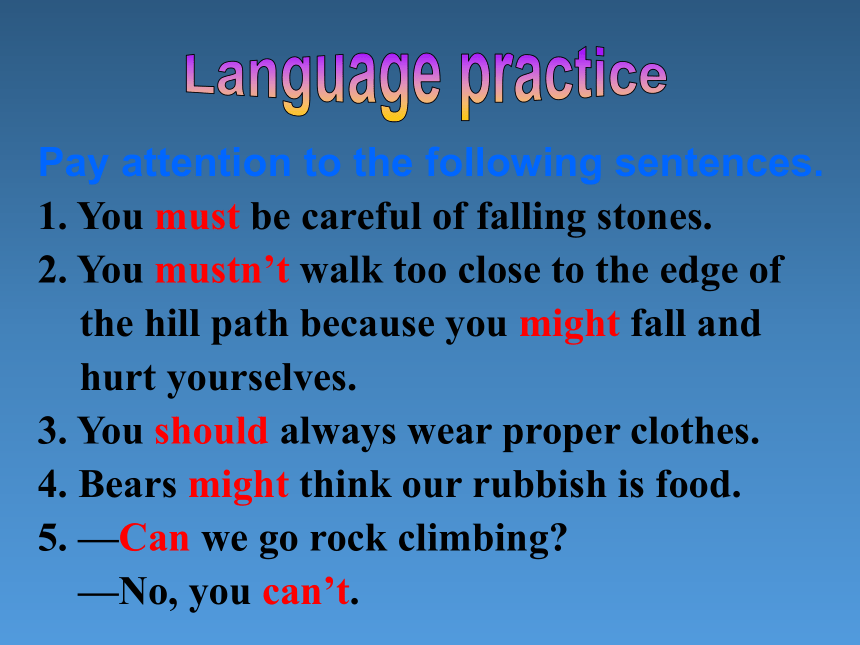
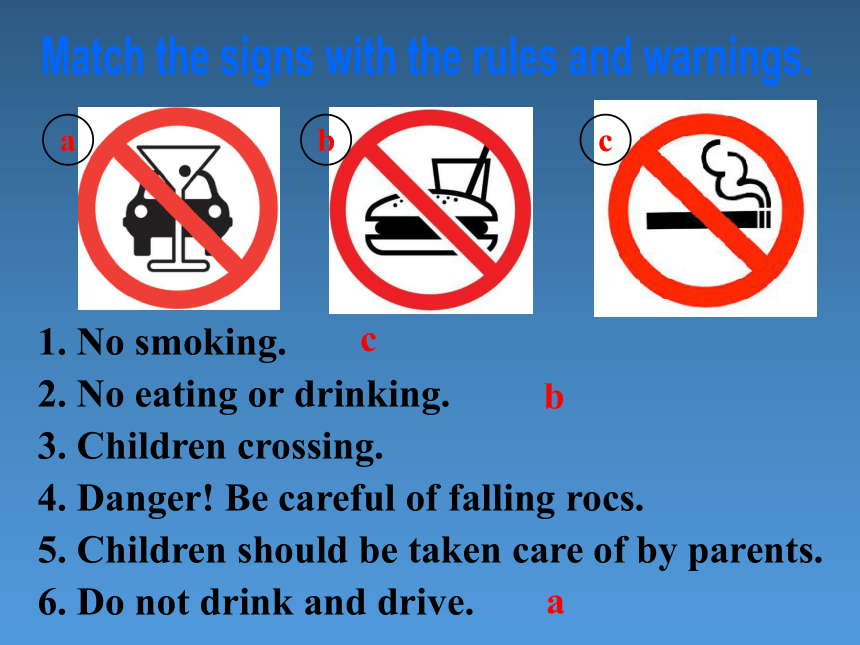
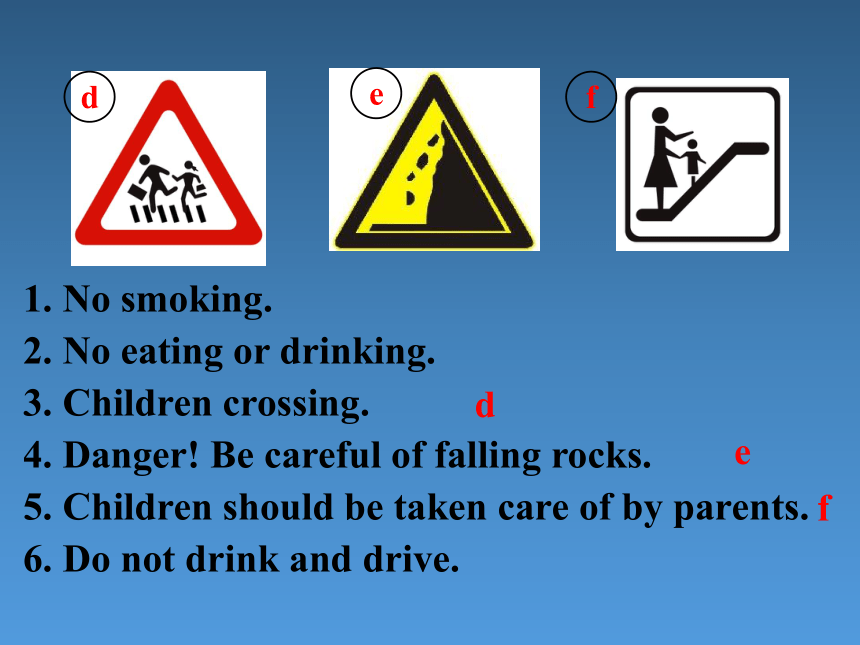
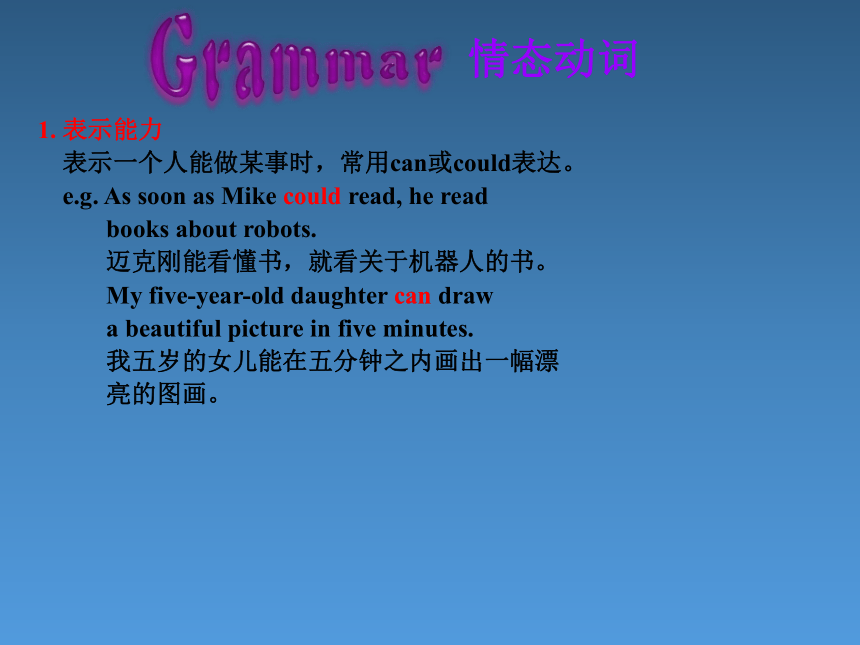
文档简介
(共45张PPT)
Must we obey the traffic rules
Must we obey the school rules
What do you think of their behaviors
What do you think of his behavior
Have you ever made such kind of paper by hand
Pay attention to the following sentences.
1. You must be careful of falling stones.
2. You mustn’t walk too close to the edge of the hill path because you might fall and hurt yourselves.
3. You should always wear proper clothes.
4. Bears might think our rubbish is food.
5. —Can we go rock climbing
—No, you can’t.
1. No smoking.
2. No eating or drinking.
3. Children crossing.
4. Danger! Be careful of falling rocs.
5. Children should be taken care of by parents.
6. Do not drink and drive.
a
b
c
a
b
c
1. No smoking.
2. No eating or drinking.
3. Children crossing.
4. Danger! Be careful of falling rocks.
5. Children should be taken care of by parents.
6. Do not drink and drive.
d
e
f
e
d
f
1. 表示能力
表示一个人能做某事时,常用can或could表达。
e.g. As soon as Mike could read, he read
books about robots.
迈克刚能看懂书,就看关于机器人的书。
My five-year-old daughter can draw
a beautiful picture in five minutes.
我五岁的女儿能在五分钟之内画出一幅漂
亮的图画。
情态动词
2. 表示可能性
如果要表达“可能,可能性”,可以用may/ might或 can/ could.
e.g. Jane may be at home. 简可能在家。
I might talk to him.
我可能会跟他说说
You can go to Beijing by train.
你可以坐火车去北京。
3. 表示许可或征求对方许可
如果表达允许某人做某事,或征求对方的许可,可以用can/could/may/might。
e.g. You can / may start your work now.
你现在可以开始工作了。
Could / May I come a little later
tomorrow I don’t feel myself.
我明天可以晚到一会吗 我觉得不太舒
服。
4. 表示请求对方做某事
如果要请求对方做某事,可以用下列表达方式:
Will / Would / Could you (please) …
Would you mind …
e.g. Would you please help me with this
suitcase
你可以帮我拿这个手提箱吗?
Would you mind turning down the
music
你能把声音关小点儿声吗?
5. 表示建议和邀请
表建议和邀请可用下列表达方式:
Would you like (to) …
Shall we …
e.g. Would you like to play basketball
你想打篮球吗?
Shall we go 我们走吧?
6. 表示意愿
表示想做某事可以用would like/ love to …
e.g. I’d like to be a scientist.
我想成为科学家。
7. 表示应该、义务
表示应该、义务等时常用should, ought to, must.
e.g. You should talk to your parents.
你应该跟你父母谈谈。
I ought to train more to improve my
skill. 我应该多训练来提高技巧。
8. 表示命令、禁止、不得不
表示这类含义时,一般用must, mustn’t, have to等。
e.g. You must study maths to be an
engineer.
要当工程师,你必须学数学。
You mustn’t tell it to anyone.
你不许把这件事告诉任何人。
You have to come early tomorrow.
你明天得早到。
9. 表示没必要做某事
表示没必要做某事时,常用needn’t, don’t have to等。
e.g. You don’t have to worry about
money. I can lend you some in
time of need.
你不用担心钱,你需要的时候我
可以借给你。
London Indoor Climbing Centre
Visitors please note:
Dos
Check in at the main gate when you come to the center.
Climb with someone.
Wear a hard hat at all times.
Wear the correct climbing shoes.
Wear comfortable clothes.
Don’ts
Don’t climb without a rope.
Don’t eat or drink anywhere except in the restaurant.
Don’t listen to personal music players while climbing.
Don’t talk on a mobile phone while climbing.
Answers:
You must check in at the main gate when you come to the center.
You must climb with someone.
You must wear a hard hat at all times.
You must wear the correct climbing shoes.
You should wear comfortable clothes.
You mustn’t climb without a rope.
You mustn’t eat or drink anywhere except in the restaurant.
You shouldn’t listen to personal music players while climbing.
You mustn’t talk on a mobile phone while climbing.
1. Why must you climb with someone
2. Why must you wear comfortable clothes
3. Why mustn’t you climb without a rope
4. Why shouldn’t you listen to music while climbing
—Why must you check in when you come to the centre
—Because they want to know who is there.
although keep stream tourist worry
People are very (1) _______ about the conditions of the ancient forests of Canada and want to save them. Many visitors to the forests use knives to cut their names into the trees, some of which are hundreds of years old.
worried
(2) ________ there are litter bins, people still throw rubbish into the (3) ______ and this causes plants and fish to die.
People from local villages have helped clean up the forests. We hope (4) _______ will play their part in (5) _______ Canada’s forests clean too!
tourists
keeping
although keep stream tourist worry
Although
stream
1. You should _______________________.
2. You shouldn’t _____________________.
3. You must _________________________.
4. You mustn’t ______________________.
gun smooth sticks stone sudden tent whenever
1. Come and visit me _________ you have time.
2. The wall is made of ______.
3. The path to the top is not very _______.
4. Remember to take a ____ with you to sleep in, because it might rain.
whenever
sticks
smooth
tent
5. He lifted up the _____ and pointed it at the bear.
6. There was a ______ noise in the woods and we all stopped moving.
7. Birds use small ______ and leaves to make a home.
gun
sudden
stones
gun, smooth, sticks, stone sudden, tent, whenever
1. Is Zhang Wenpeng’s school a green one
Yes, it is.
2. What should we do when we leave a room
We should turn off the light.
1. What does Zhang Wenpeng try say with his drawing
People must wake up to the fact that pollution is causing damage to the progress we’ve made.
2. What does Zhou Zhiyun try to say with his painting
People must not waste electricity.
3. What does the school suggest the students should do
The students should pass on what they have learnt in school to their parents and neighbours.
4. How can a school become a “green school”
A school must include education about the environment as part of the timetable.
1. The first thing you have to do is to
______________ carefully.
2. Think about where ____________________
and whether there are ___________________.
3. You should only take marked ________.
plan the work
you are going to work
clearly marked paths
paths
4. Make sure you know where ___________ for lunch.
5. Don’t forget to tell people to _________ for the picnic.
6. Don’t walk when it is ________ or in _________________.
7. You must not try out a ___________
with a group.
you can stop
bring food
too hot
very bad weather
new work
Ecotourism
Ecotourism is also known as “responsible tourism”. It means you visit places without damaging the environment. Many countries around the world have started ecotourism holidays and trips. Tourists help the local communities look after their natural environment. Here are some rules of ecotourism.
Dos
Take rubbish away with you.
Walk on paths or roads.
Take photos but nothing else.
Don’ts
Don’t pick flowers or damage trees.
Don’t pollute rivers or streams.
Don’t make open fires in the forests.
visiting someone’s home
eating and drinking
travelling on public transport
behaving politely in public
visiting tourist sights
You must …
You mustn’t …
You should …
You shouldn’t …
1. —Must I hand in my homework now, Mr. Smith
—No, you _______.
A. can’t B. shouldn’t
C. wouldn’t D. needn’t
2. —Excuse me, may I keep the book a little longer
—Sorry. You ________ return it today.
A. must B. mustn’t
C. can D. can’t
3. —Is the man over there Mr. Brown
—It ____ him. He has gone to Brazil.
A. may not B. can’t be
C. shouldn’t D. mustn’t
4. Children ____ sit in the front seat of a car. It’s too dangerous.
A. need B. needn’t
C. must D. mustn’t
1. —Must I water the flowers now, mum
—No, you ____. You ____ do it later.
【2014铜仁】
A. mustn’t; must B. mustn’t; may
C. needn’t; may D. needn’t; must
2. —____ I know by what time you want
the project to be done
—By the day after tomorrow. ____ you
finish it on time 【2014连云港】
A. May; Can B. Must; Need
C. Could; Must D. Need; Would
3. —Who’s singing in the garden
—It _____ be Mr. Brown. He always
practices singing at this time.
【2014长沙】
A. must B. can’t C. need
4. I _____ follow you. Would you please
repeat it 【2014河北】
A. can’t B. mustn’t
C. needn’t D. shouldn’t
制作一个海报,宣传环保学校的做法。
Must we obey the traffic rules
Must we obey the school rules
What do you think of their behaviors
What do you think of his behavior
Have you ever made such kind of paper by hand
Pay attention to the following sentences.
1. You must be careful of falling stones.
2. You mustn’t walk too close to the edge of the hill path because you might fall and hurt yourselves.
3. You should always wear proper clothes.
4. Bears might think our rubbish is food.
5. —Can we go rock climbing
—No, you can’t.
1. No smoking.
2. No eating or drinking.
3. Children crossing.
4. Danger! Be careful of falling rocs.
5. Children should be taken care of by parents.
6. Do not drink and drive.
a
b
c
a
b
c
1. No smoking.
2. No eating or drinking.
3. Children crossing.
4. Danger! Be careful of falling rocks.
5. Children should be taken care of by parents.
6. Do not drink and drive.
d
e
f
e
d
f
1. 表示能力
表示一个人能做某事时,常用can或could表达。
e.g. As soon as Mike could read, he read
books about robots.
迈克刚能看懂书,就看关于机器人的书。
My five-year-old daughter can draw
a beautiful picture in five minutes.
我五岁的女儿能在五分钟之内画出一幅漂
亮的图画。
情态动词
2. 表示可能性
如果要表达“可能,可能性”,可以用may/ might或 can/ could.
e.g. Jane may be at home. 简可能在家。
I might talk to him.
我可能会跟他说说
You can go to Beijing by train.
你可以坐火车去北京。
3. 表示许可或征求对方许可
如果表达允许某人做某事,或征求对方的许可,可以用can/could/may/might。
e.g. You can / may start your work now.
你现在可以开始工作了。
Could / May I come a little later
tomorrow I don’t feel myself.
我明天可以晚到一会吗 我觉得不太舒
服。
4. 表示请求对方做某事
如果要请求对方做某事,可以用下列表达方式:
Will / Would / Could you (please) …
Would you mind …
e.g. Would you please help me with this
suitcase
你可以帮我拿这个手提箱吗?
Would you mind turning down the
music
你能把声音关小点儿声吗?
5. 表示建议和邀请
表建议和邀请可用下列表达方式:
Would you like (to) …
Shall we …
e.g. Would you like to play basketball
你想打篮球吗?
Shall we go 我们走吧?
6. 表示意愿
表示想做某事可以用would like/ love to …
e.g. I’d like to be a scientist.
我想成为科学家。
7. 表示应该、义务
表示应该、义务等时常用should, ought to, must.
e.g. You should talk to your parents.
你应该跟你父母谈谈。
I ought to train more to improve my
skill. 我应该多训练来提高技巧。
8. 表示命令、禁止、不得不
表示这类含义时,一般用must, mustn’t, have to等。
e.g. You must study maths to be an
engineer.
要当工程师,你必须学数学。
You mustn’t tell it to anyone.
你不许把这件事告诉任何人。
You have to come early tomorrow.
你明天得早到。
9. 表示没必要做某事
表示没必要做某事时,常用needn’t, don’t have to等。
e.g. You don’t have to worry about
money. I can lend you some in
time of need.
你不用担心钱,你需要的时候我
可以借给你。
London Indoor Climbing Centre
Visitors please note:
Dos
Check in at the main gate when you come to the center.
Climb with someone.
Wear a hard hat at all times.
Wear the correct climbing shoes.
Wear comfortable clothes.
Don’ts
Don’t climb without a rope.
Don’t eat or drink anywhere except in the restaurant.
Don’t listen to personal music players while climbing.
Don’t talk on a mobile phone while climbing.
Answers:
You must check in at the main gate when you come to the center.
You must climb with someone.
You must wear a hard hat at all times.
You must wear the correct climbing shoes.
You should wear comfortable clothes.
You mustn’t climb without a rope.
You mustn’t eat or drink anywhere except in the restaurant.
You shouldn’t listen to personal music players while climbing.
You mustn’t talk on a mobile phone while climbing.
1. Why must you climb with someone
2. Why must you wear comfortable clothes
3. Why mustn’t you climb without a rope
4. Why shouldn’t you listen to music while climbing
—Why must you check in when you come to the centre
—Because they want to know who is there.
although keep stream tourist worry
People are very (1) _______ about the conditions of the ancient forests of Canada and want to save them. Many visitors to the forests use knives to cut their names into the trees, some of which are hundreds of years old.
worried
(2) ________ there are litter bins, people still throw rubbish into the (3) ______ and this causes plants and fish to die.
People from local villages have helped clean up the forests. We hope (4) _______ will play their part in (5) _______ Canada’s forests clean too!
tourists
keeping
although keep stream tourist worry
Although
stream
1. You should _______________________.
2. You shouldn’t _____________________.
3. You must _________________________.
4. You mustn’t ______________________.
gun smooth sticks stone sudden tent whenever
1. Come and visit me _________ you have time.
2. The wall is made of ______.
3. The path to the top is not very _______.
4. Remember to take a ____ with you to sleep in, because it might rain.
whenever
sticks
smooth
tent
5. He lifted up the _____ and pointed it at the bear.
6. There was a ______ noise in the woods and we all stopped moving.
7. Birds use small ______ and leaves to make a home.
gun
sudden
stones
gun, smooth, sticks, stone sudden, tent, whenever
1. Is Zhang Wenpeng’s school a green one
Yes, it is.
2. What should we do when we leave a room
We should turn off the light.
1. What does Zhang Wenpeng try say with his drawing
People must wake up to the fact that pollution is causing damage to the progress we’ve made.
2. What does Zhou Zhiyun try to say with his painting
People must not waste electricity.
3. What does the school suggest the students should do
The students should pass on what they have learnt in school to their parents and neighbours.
4. How can a school become a “green school”
A school must include education about the environment as part of the timetable.
1. The first thing you have to do is to
______________ carefully.
2. Think about where ____________________
and whether there are ___________________.
3. You should only take marked ________.
plan the work
you are going to work
clearly marked paths
paths
4. Make sure you know where ___________ for lunch.
5. Don’t forget to tell people to _________ for the picnic.
6. Don’t walk when it is ________ or in _________________.
7. You must not try out a ___________
with a group.
you can stop
bring food
too hot
very bad weather
new work
Ecotourism
Ecotourism is also known as “responsible tourism”. It means you visit places without damaging the environment. Many countries around the world have started ecotourism holidays and trips. Tourists help the local communities look after their natural environment. Here are some rules of ecotourism.
Dos
Take rubbish away with you.
Walk on paths or roads.
Take photos but nothing else.
Don’ts
Don’t pick flowers or damage trees.
Don’t pollute rivers or streams.
Don’t make open fires in the forests.
visiting someone’s home
eating and drinking
travelling on public transport
behaving politely in public
visiting tourist sights
You must …
You mustn’t …
You should …
You shouldn’t …
1. —Must I hand in my homework now, Mr. Smith
—No, you _______.
A. can’t B. shouldn’t
C. wouldn’t D. needn’t
2. —Excuse me, may I keep the book a little longer
—Sorry. You ________ return it today.
A. must B. mustn’t
C. can D. can’t
3. —Is the man over there Mr. Brown
—It ____ him. He has gone to Brazil.
A. may not B. can’t be
C. shouldn’t D. mustn’t
4. Children ____ sit in the front seat of a car. It’s too dangerous.
A. need B. needn’t
C. must D. mustn’t
1. —Must I water the flowers now, mum
—No, you ____. You ____ do it later.
【2014铜仁】
A. mustn’t; must B. mustn’t; may
C. needn’t; may D. needn’t; must
2. —____ I know by what time you want
the project to be done
—By the day after tomorrow. ____ you
finish it on time 【2014连云港】
A. May; Can B. Must; Need
C. Could; Must D. Need; Would
3. —Who’s singing in the garden
—It _____ be Mr. Brown. He always
practices singing at this time.
【2014长沙】
A. must B. can’t C. need
4. I _____ follow you. Would you please
repeat it 【2014河北】
A. can’t B. mustn’t
C. needn’t D. shouldn’t
制作一个海报,宣传环保学校的做法。
同课章节目录
- Module 1 Travel
- Unit 1 We toured the city by bus and by taxi
- Unit 2 It's a long story.
- Unit 3 Language in use
- Module 2 Education
- Unit 1 They don't sit in rows.
- Unit 2 What do I like best about school?
- Unit 3 Language in use
- Module 3 Life now and then
- Unit 1 They sometimes work harder.
- Unit 2 I think life is better today.
- Unit 3 Language in use.
- Module 4 Rules and suggestions
- Unit 1 You must be careful of falling stones.
- Unit 2 we must keep the camp clean.
- Unit 3 Language in use.
- Revison A
- Module 5 Look after yourself
- Unit 1 We'd better get you to hospital.
- Unit 2 Get off the sofa!
- Unit 3 Language in use.
- Module 6 Eating togethe
- Unit 1 When is the school-leavers' party?
- Unit 2 Knives and forks are used for most Western
- Unit 3 Language in use
- Module 7 English for you and me
- Unit 1 Have you ever been to an English corner?
- Unit 2 We all own English.
- Unit 3 Language in use
- Module 8 My future life
- Unit 1 Here's to our friendship and the future
- Unit 2 I know that you will be better at maths.
- Unit 3 Language in use
- Revison B
